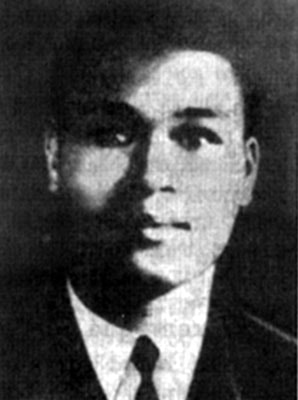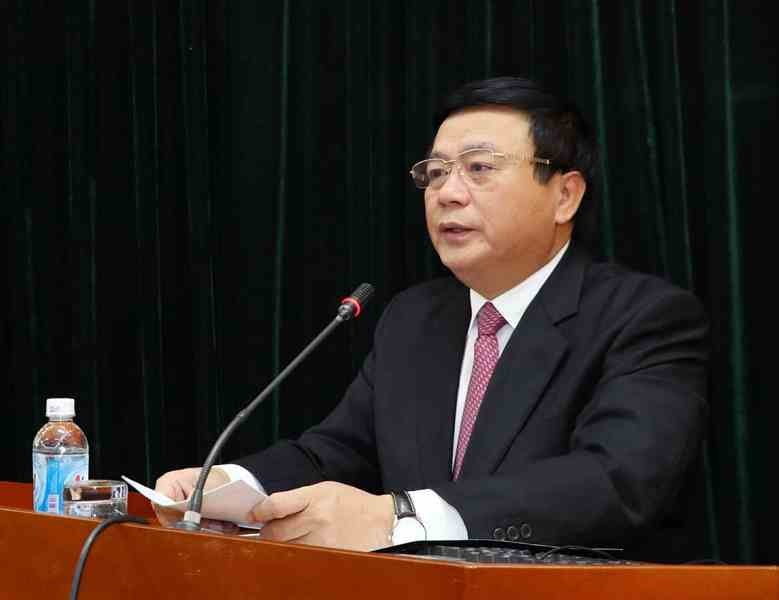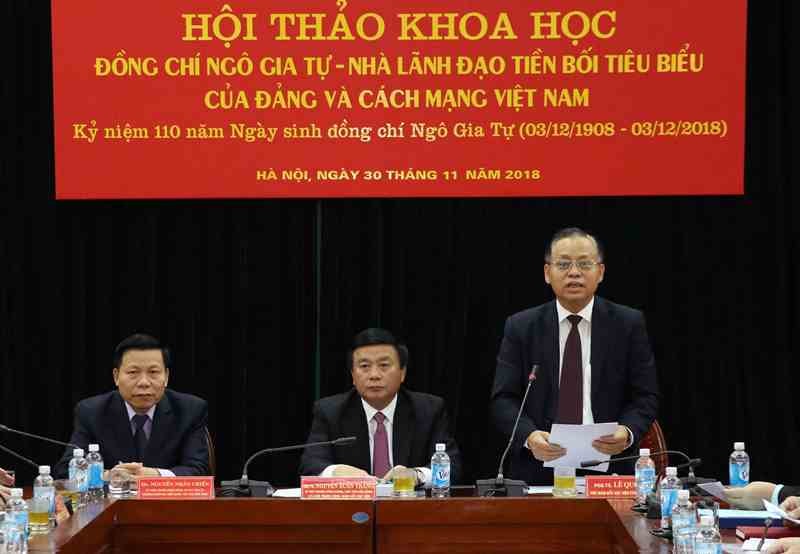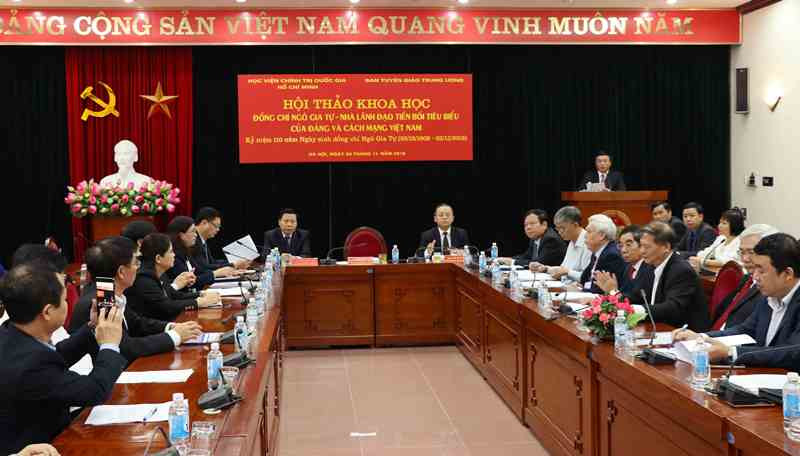Comrade Ngo Gia Tu - the person who laid the foundation for the birth of communist organizations in Vietnam
This is one of the arguments raised at the scientific workshop “Comrade Ngo Gia Tu - A typical senior leader of the Party and the Vietnamese revolution”. The workshop was organized by the Ho Chi Minh National Academy of Politics in coordination with the Central Propaganda Department on November 30.
The workshop was held to commemorate the 110th anniversary of the birth of comrade Ngo Gia Tu (December 3, 1908 - December 3, 2018).
Speaking at the workshop, Prof. Dr. Nguyen Xuan Thang - Secretary of the Party Central Committee, Chairman of the Central Theoretical Council, Director of the Ho Chi Minh National Academy of Politics emphasized: Remembering comrade Ngo Gia Tu, we are proud of a staunch communist, an outstanding senior leader of the Party and the Vietnamese revolution, an outstanding son of the nation.
 |
| Comrade Ngo Gia Tu. Photo archive |
The report introducing the Workshop highlighted the important contributions and role of comrade Ngo Gia Tu to the Vietnamese revolution in many aspects: The initiator of the "proletarianization" movement, laying the foundation for the birth of communist organizations in Vietnam; the person who made important contributions in the process of founding the Communist Party of Vietnam; a loyal, indomitable communist, a shining example of revolutionary ethics, sacrificing his whole life for the revolutionary cause of the Party and the nation.
"Remembering comrade Ngo Gia Tu, we are proud of a staunch communist, an outstanding senior leader of the Party and the Vietnamese revolution, an outstanding son of the nation. Expressing gratitude for comrade Ngo Gia Tu's great contributions to the country and homeland, we vow to learn and follow his shining example of revolutionary morality; determined to strive to build our country more and more prosperous", said Prof. Dr. Nguyen Xuan Thang.
 |
| Comrade Nguyen Xuan Thang - Secretary of the Party Central Committee, Chairman of the Central Theoretical Council spoke at the workshop. |
The presentations at the Conference all affirmed that Comrade Ngo Gia Tu had made great contributions to the Party and the revolution of our country. He was a person who was enlightened about the revolution early and actively spread Marxism-Leninism in Vietnam. With a keen political perspective and strategic vision, Comrade Ngo Gia Tu proposed the policy and initiated the "proletarianization" movement, laying the foundation for the birth of communist organizations in Vietnam. He was one of the founders of the Indochinese Communist Party - the predecessor of the Communist Party of Vietnam and the person who proposed and fought resolutely for the establishment of a political party of the Vietnamese working class.
Speaking at the workshop titled “The Party Committee and people of Bac Ninh study and follow the exemplary revolutionary morality of comrade Ngo Gia Tu”, comrade Nguyen Nhan Chien said: Comrade Ngo Gia Tu directly directed the establishment of the Communist Indochina of Bac Ninh - Bac Giang on August 4, 1929 at Hong Van mountain (Lim mountain, Tien Du district), laying the foundation for the development of the revolutionary movement. At the same time, this was also an important turning point, marking the remarkable growth of the revolutionary movement in the two provinces of Bac Ninh and Bac Giang.
Prof. Dr. Mach Quang Thang, Ho Chi Minh National Academy of Politics, commented: Raising the sense of responsibility also goes hand in hand with setting an example of dedication to work, daring to do, daring to take responsibility before the Party organization. Comrade Ngo Gia Tu is such a shining example. In the current situation, only with a Communist heart with full spirit and responsibility can a Communist with position and power escape all temptations, especially the temptation of power, material things, and money.
 |
| The comrades chaired the workshop. |
Comrade Ngo Gia Tu was born into a Confucian family in Tam Son village, Tu Son, Kinh Bac region, now Tam Son commune, Tu Son town, Bac Ninh province. In 1922, Ngo Gia Tu passed the entrance exam to Buoi school, Hanoi. In mid-1926, while in his fourth year, comrade Ngo Gia Tu joined the movement to demand freedom for patriot Phan Boi Chau. Returning to his hometown, he continued to study by himself, teaching and participating in revolutionary activities. At the end of 1926, after the exciting days with all classes of people mourning and paying their respects to patriot Phan Chu Trinh, at house number 47, Tran Nhan Tong street, Hanoi, comrade Ngo Gia Tu was admitted to the Vietnam Revolutionary Youth Association.
At the National Congress of the Vietnamese Revolutionary Youth held in Hong Kong (China) in May 1929, comrade Ngo Gia Tu and the Northern delegates resolutely fought, raising the demand to immediately establish the Communist Party in Vietnam but did not achieve any results. The Northern delegation announced their withdrawal from the Congress and left. Returning to the country, comrade Ngo Gia Tu and his comrades continued to lead the revolutionary movement, propagandizing and mobilizing support for the establishment of the Communist Party. On June 17, 1929, at No. 312, Kham Thien, Hanoi, the Indochinese Communist Party was officially born. Comrade Ngo Gia Tu joined the provisional Central Executive Committee. Immediately after that, he returned to Bac Ninh to establish the first Party cell of the province, including 3 party members: Ho Ngoc Lan, Pham Van Chat and Nguyen Huu Can. Implementing his instructions, on August 4, 1929, the Indochinese Communist Party of Bac Ninh - Bac Giang was born, promptly leading the revolutionary movement in the two provinces.
After the founding of the Communist Party of Vietnam, Comrade Ngo Gia Tu was appointed Secretary of the Southern Regional Party Committee. Under his leadership, the movement developed strongly. The Southern Regional Party Committee opened many short-term training courses for cadres and party members. Comrade Ngo Gia Tu directly taught some of the classes.
While the revolutionary movement in the whole country and in the South was developing strongly, on the night of May 31, 1930, during a manhunt by the French, comrade Ngo Gia Tu was arrested in Phu An hamlet, on the Thi Nghe river, Saigon. Before that, on March 8, 1930, the colonial court in Bac Ninh tried and sentenced Ngo Gia Tu to death in absentia. On October 27, 1931, from Saigon, they brought him back to Bac Ninh and still upheld the death sentence.
He resolutely appealed to the Hanoi High Court. The French colonialists were forced to reduce his sentence to life imprisonment and imprisoned him in prisons such as Hoa Lo (Hanoi), Central Prison (Saigon) and finally exiled him to Con Dao. During his years in prison, comrade Ngo Gia Tu always persevered in his revolutionary spirit, not only enduring the enemy's beatings and harsh prison regime but also being optimistic and believing in the inevitable victory of the revolution by turning the prison into a school for communists. Comrade Ngo Gia Tu became an excellent revolutionary teacher in the heart of the imperialist prison. In early 1935, the Con Dao Prison Party Cell decided to send comrade Ngo Gia Tu and a number of other comrades to escape from prison and return to the mainland to continue their activities. But the escape failed, comrade Ngo Gia Tu and a number of other comrades sacrificed their lives at sea. That year, comrade Ngo Gia Tu was only 26 years old.
 |
| Many scientists attended the conference. |
Comrade Ngo Gia Tu is a symbol of Vietnamese revolutionary heroism; demonstrating the noble revolutionary moral qualities of a Communist Party member: loyal to the Party, devoted to the people, and a lifelong struggle and sacrifice for the Party's ideals and for the happiness of the people. During his years of secret activities, as well as when he was captured, tortured, and imprisoned by the enemy, he always upheld his indomitable spirit, maintained the integrity of a steadfast Communist soldier, and overcame all dangers and challenges. His entire life and revolutionary career are a model of the noble qualities of a Communist for today's and future generations to learn from.

